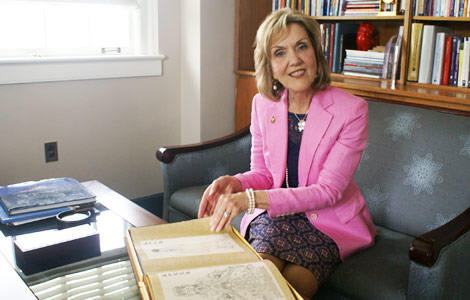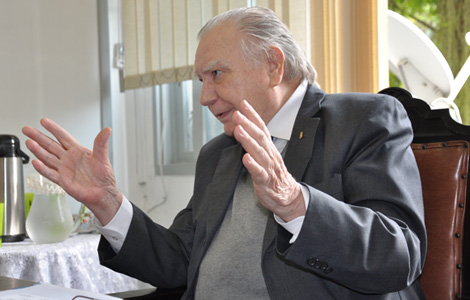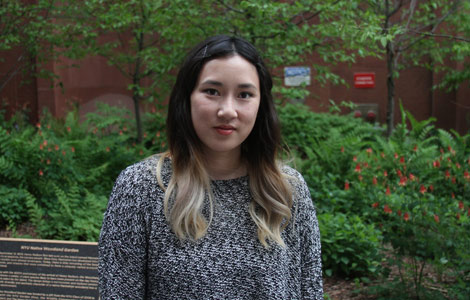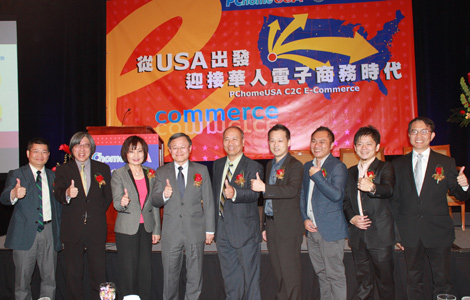Finding the best way to teach Chinese
Updated: 2014-05-16 08:51
By CHUNYING CAI in College Park, MD (China Daily USA)
|
||||||||
|
 Donna Wiseman, director of Confucius Institute and dean of College of Education at the University of Maryland, showcases a book about the teaching of an ancient Chinese sage. Cai Chunying / China Daily
|
To Donna Wiseman, director of the Confucius Institute at the University of Maryland, the fact that her institute is the first of its kind in the US brings both pride and profound responsibility.
Established in 2004, the institute is now one of the more than 100 Confucius Institutes in the US — and 440 in the world.
"I think we paved the road. People do look to us to see what we are doing," said Wiseman, who serves as dean of the College of Education at the University of Maryland (UMD). "We feel very strongly that we need to be a good role model."
The institute, she said, has managed to stay focused on the core mission of CI worldwide — teaching the Chinese language in foreign countries. Its non-credit classes enroll about 100 people, including the university’s students and faculty members, as well as people from surrounding communities.
The institute also houses a HSK testing center which provides standardized testing for proficiency in Chinese. According to Wiseman, the institute has tested more Chinese-language learners than anywhere in the US. The institute’s data show that about 940 people from nearby states took the test in 2013 and about 600 people have attended this year so far.
"There is an expanding need for people who understand the Chinese language. If an American has knowledge of the Chinese language, then it really opens up opportunities for them in business or government, particularly in the Washington region," said Wiseman, who held various leadership positions at Northern Illinois University and Texas A&M University before joining UMD in 2001.
One thing that stands out and makes Wiseman particularly proud is the institute’s ability to prepare Chinese-language teachers at public schools, mainly at the elementary and secondary school level.
With funds from Confucius Institute Headquarters in Beijing four years ago, Wiseman was able to build a brand new academic unit within her own College of Education, called the Center for Chinese Teacher Certification and Development, to offer master’s degrees and certificates to students who aspire to becoming Chinese-language teachers.
"There is such a demand. Each time we prepare a group of teachers, every one of them is hired almost immediately," said Wiseman, who was a public school teacher before entering the field of higher education.
Wiseman said when she was appointed to the position by the university’s president four years ago, she started looking for ways to enhance the institute, and teaching, which the university is good at, was the obvious thing for her to focus on.
"You have to look at your own strength at your own university and make a decision about what it is you are already doing at your campus and can be enhanced by the Confucius Institute," said Wiseman, who often receives inquiries from universities looking for advice on establishing Confucius Institutes on their campus.
"Confucius Institute is very adaptable. Each CI has a brand or stamp it is known for. In our location, it just happens that we are focused on teaching. So look for something that is unique to them and their way of increasing Chinese language and culture," said Wiseman, who has published books and articles on literacy and teacher education.
Wiseman first went to China in 1986 with her husband who was in charge of international education at Texas A & M University. That helped to develop her interest in China. Wiseman later traveled to China on her own academic exchanges, often giving lectures to universities in China.
"It’s been fascinating to watch China change over the years I visited," Wiseman said, adding that she now goes to China at least once a year in her role as director.
Wiseman said her next goal is to have the institute become very innovative in teaching Chinese language, mainly integrating technology into education.
She also hopes the institute can devote more on research into how people best learn the Chinese language.
"We need to be asking questions about how people best learn language and culture, how can we encourage it, and how can we really build it up to find out what is the best way to teach and learn the Chinese language. "

 PLA chief pays visit to US
PLA chief pays visit to US
 Older parents work to have children after losing their only child
Older parents work to have children after losing their only child
 Finding the best way to teach Chinese
Finding the best way to teach Chinese
 Forum trends: Some "bad" habits I've picked up in China
Forum trends: Some "bad" habits I've picked up in China
 Chinese man's killing reflects'dangerous'neighborhood
Chinese man's killing reflects'dangerous'neighborhood
 'Red Chamber' play aims to put audience asleep
'Red Chamber' play aims to put audience asleep
 Wuhan high-tech zone ready for investors, students
Wuhan high-tech zone ready for investors, students
 Rio Confucius Institute is blossoming
Rio Confucius Institute is blossoming
Most Viewed
Editor's Picks

|

|

|

|

|

|
Today's Top News
Islamic leaders join efforts against extremism
Xi: There is no gene for invasion in our blood
July elections in Thailand 'unlikely' amid crisis
China: US must be objective about Asia tensions
Big piece of first Chinese jetliner completed
Protecting environment tops public concerns in poll
2 Chinese killed in Vietnam riots
China, Russia to sign gas deal
US Weekly

|

|







